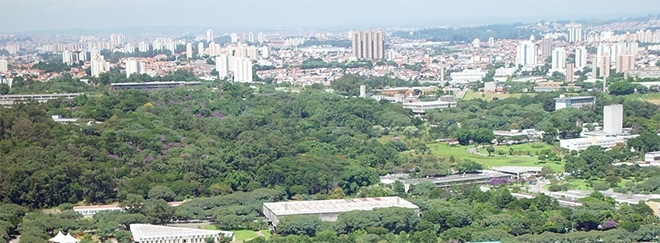

Group of more than 50 researchers plans to advance knowledge and innovation associated with the adoption of water management practices and implementation of environmental governance (foto: Hamilton Furtado / Wikimedia)
Group of more than 50 researchers plans to advance knowledge and innovation associated with the adoption of water management practices and implementation of environmental governance.
Group of more than 50 researchers plans to advance knowledge and innovation associated with the adoption of water management practices and implementation of environmental governance.

Group of more than 50 researchers plans to advance knowledge and innovation associated with the adoption of water management practices and implementation of environmental governance (foto: Hamilton Furtado / Wikimedia)
By Maria Fernanda Ziegler, in New York | Agência FAPESP – Issues such as environmental sanitation, water, ecosystem services and climate change tend to overlap when analyzed within the context of a region’s environmental governance. In light of this, a group made up of more than 50 researchers from São Paulo institutions are studying environmental governance in the macrometropolis of São Paulo on an interdisciplinary basis.
"It’s important to say that there is no hegemony in this project. What is important is building bridges. My overriding concern is spending time creating a horizontal dialogue of knowledge where everyone can ideally support an interdisciplinary esprit de corps. To that extent, we are being innovators in what we are doing, besides also proposing innovations,” said Pedro Jacobi, coordinator of the thematic project "Environmental governance of the macrometropolis of São Paulo in the face of climate variability", in a presentation given during FAPESP Week New York.
The meeting, held at the City University of New York (CUNY) November 26-28, 2018, involved Brazilian and U.S. researchers with the aim of strengthening research partnerships.
According to Jacobi, the project’s objective, aside from identifying the environmental issues of the macrometropolis, also involve proposing best practices. “We want to show those who formulate public policy that there are opportunities for best practices at the three levels of government,” he said.
The impact of climate change as an aggravating factor to disorganized urbanization was evident in São Paulo during the 2015 water shortage.
According to project researchers, the issue has transcended the metropolitan area of São Paulo, affecting regions that extend to the Piracicaba-Capivari-Jundiaí, mid-Tiete, Paraíba do Sul and Vale do Ribeira river basins.
“We are facing a difficult situation with regard to water. We need to let everyone know that water is a scarce asset that needs to be treated differently, and the public needs to be a part of this discussion,” he said.
It is no accident that the thematic project is working with an innovative geographical cross-section: the macrometropolis, an environment that goes beyond interrelated metropolitan regions. The São Paulo macrometropolis encompasses 174 municipalities of the metropolitan areas of São Paulo, Campinas, Sorocaba, Baixada Santista and the area surrounding the Vale do Paraíba.
The project is focused on five sub-themes: environmental sanitation, territory, ecosystem services, energy and climate change. “I understand that unfortunately, people are still not being adequately trained to work within interdisciplinary culture. Thus, generally speaking, there is little dialogue between the social sciences and the exact and biological sciences. Promoting dialogue among the various fields is a concern that guides our work,” Jacobi said.
There is also a cross-sectional theme, which is social learning, aimed at the process of generating knowledge that is not restricted to a core group of experts. “The idea is to strengthen a set of initiatives that allow us to expand dialogue with society, with those who are involved in public policy, and with non-governmental organizations that have been influential in their dialogue with public policy management,” he said.
The project has already resulted in nearly 15 articles that are being submitted for publication, one magazine and two books about to be published.
Republish
The Agency FAPESP licenses news via Creative Commons (CC-BY-NC-ND) so that they can be republished free of charge and in a simple way by other digital or printed vehicles. Agência FAPESP must be credited as the source of the content being republished and the name of the reporter (if any) must be attributed. Using the HMTL button below allows compliance with these rules, detailed in Digital Republishing Policy FAPESP.





